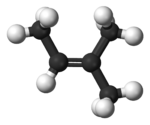2-Methyl-2-butene, 2m2b, 2-methylbut-2-ene, beta-isoamylene, or Trimmethylethylene is an alkene hydrocarbon with the molecular formula C5H10.

| |

| |
| Names | |
|---|---|
| Preferred IUPAC name
2-Methylbut-2-ene | |
| Other names
β-Isoamylene
Trimethylethylene 2-Methyl-2-butene Isoamylene | |
| Identifiers | |
3D model (JSmol)
|
|
| ChemSpider | |
| ECHA InfoCard | 100.007.416 |
PubChem CID
|
|
| UNII | |
| UN number | 2460 |
CompTox Dashboard (EPA)
|
|
| |
| |
| Properties | |
| C5H10 | |
| Molar mass | 70.1329 g/mol |
| Appearance | Colorless liquid |
| Odor | Sweet |
| Density | 0.662 g/cm3 |
| Melting point | −134 °C (−209 °F; 139 K) |
| Boiling point | 39 °C (102 °F; 312 K) |
| Slightly soluble | |
| Solubility in alcohols, ether | Miscible |
| -54.14·10−6 cm3/mol | |
Refractive index (nD)
|
1.385 |
| Hazards | |
| Occupational safety and health (OHS/OSH): | |
Main hazards
|
Mildly toxic |
| Flash point | < −45 °C (−49 °F; 228 K) |
Except where otherwise noted, data are given for materials in their standard state (at 25 °C [77 °F], 100 kPa).
| |
Used as a free radical scavenger in trichloromethane (chloroform) and dichloromethane (methylene chloride). It is also used to scavenge hypochlorous acid (HOCl) in the Pinnick oxidation.
John Snow, the English physician, experimented with it in the 1840s as an anesthetic, but stopped using it for unknown reasons.[4]
As a crucial fact, it is a flammable material, an irritant, can result in health hazards and environmental hazards.
See also
editReferences
edit- ^ Dean's Handbook of Organic Chemistry, 2nd Edition.
- ^ "Safety (MSDS) data for 2-methyl-2-butene". Archived from the original on 2009-05-14. Retrieved 2009-03-24.
- ^ PubChem
- ^ Caton, Donald (2000). "John Snow's practice of obstetric anesthesia". Anesthesiology: The Journal of the American Society of Anesthesiologists. 92 (1): 247–252. doi:10.1097/00000542-200001000-00037. PMID 10638922.